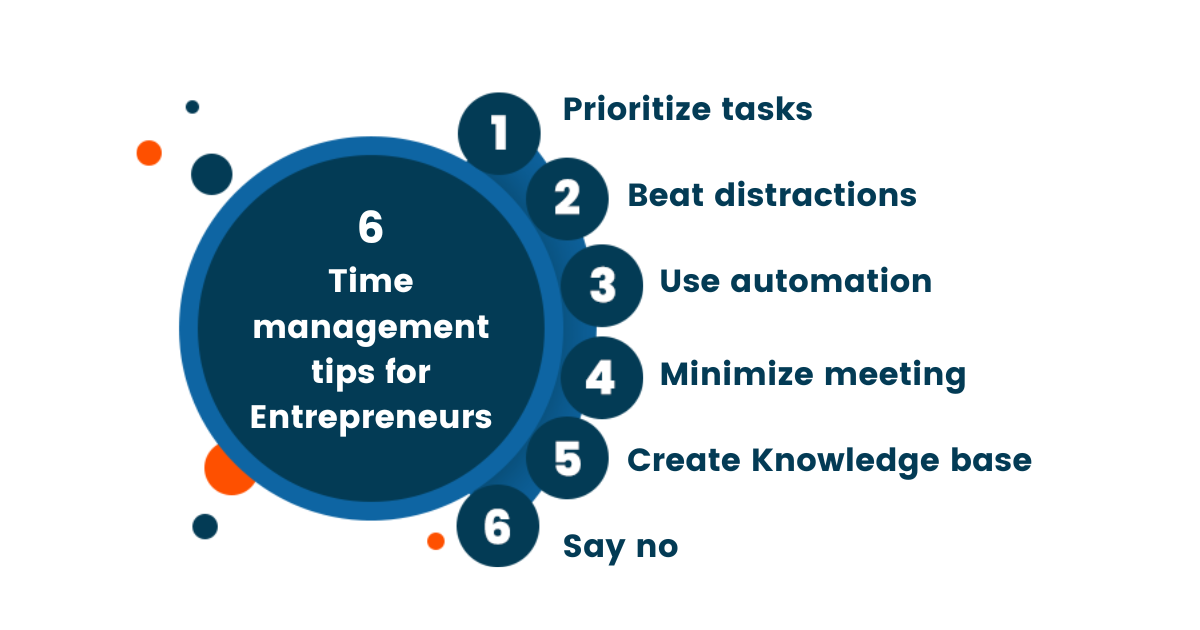Do you know the biggest trait of successful entrepreneurs and business owners?
They fiercely protect their time, focus on their goals, and efficiently multitask to get things done.
However, running a business means facing daily administrative tasks, constant phone calls, social media updates, and smartphone notifications—all of which can make peak productivity seem impossible.
But it’s not.
In this article, we’ll explore practical and achievable time management techniques designed to help busy entrepreneurs prioritize high-impact tasks while keeping day-to-day operations under control.
The Importance of Time Management for SMB Owners
As a small or medium-sized business (SMB) owner, you wear many hats. CEO, marketing director, customer service representative—the list is endless.
It’s no surprise that the average startup owner works between 50–70 hours per week.
While long hours are often necessary in the early stages, it’s crucial to recognize that your physical and mental energy are finite. Constantly firefighting tasks might feel productive, but it drains you, pulling focus away from strategic growth.
This approach isn’t sustainable. It leads to burnout and disrupts work-life balance.
The key? Prioritize demands so you can spend more time working on your business—setting the vision, enhancing customer experiences, and delegating, automating, or eliminating less critical tasks.
Practical Time Management Tips for Entrepreneurs

1. Audit Your Time Usage
Before improving time management, track how you currently spend your time. Use a time-tracking app or record your daily tasks in a spreadsheet for a week. This will reveal patterns and areas for improvement.
Once you have this data, apply the following strategies to boost productivity.
2. Prioritize Tasks with the Eisenhower Matrix
The Eisenhower Matrix is a powerful tool for prioritizing tasks effectively.
Organize your tasks into four quadrants:
- Urgent & Important – Tasks requiring immediate attention (e.g., client issues, deadlines, or critical projects). Prioritize these.
- Important but Not Urgent – Long-term goals like strategic planning, skill development, or software upgrades. Schedule these to prevent neglect.
- Urgent but Not Important – Tasks like emails or admin work. Delegate them when possible.
- Not Urgent & Not Important – Time-wasters like excessive social media scrolling. Eliminate these.
Before starting your workday, run your to-do list through this matrix to ensure high-priority tasks get the attention they deserve.
3. Use the Pomodoro Technique to Reduce Distractions
Completely disconnecting from distractions is unrealistic. Instead, structure your work to manage them effectively using the Pomodoro Technique:
- Work in 25-minute intervals (Pomodoros).
- Take 5-minute breaks between sessions.
- After four Pomodoros, take a 20–30 minute break.
Use short breaks for social media, stretching, or relaxation—but stay focused during work intervals.
4. Automate Repetitive Tasks
Automation is a game-changer for entrepreneurs looking to save time. A CRM tool like Act! can streamline business processes by automating:
- Email marketing and customer follow-ups
- Lead generation workflows
- Data organization in a centralized dashboard
Rather than manually entering customer details into spreadsheets, a CRM provides easy access to insights, allowing you to focus on strategic decisions instead of administrative work.

5. Reduce Meetings with Asynchronous Communication
Meetings contribute to $37 billion in productivity losses annually. Worse yet, 55% of professionals feel most meetings could be replaced with an email.
Instead, use asynchronous communication tools like:
- Email for updates and information sharing
- Screen recordings for walkthroughs
- Project management tools to track progress
Only schedule meetings when real-time collaboration is necessary.
6. Document Business Processes
As a business owner, you have invaluable knowledge about your operations. Instead of repeating instructions, create a knowledge base with:
- Video tutorials
- Standard Operating Procedures (SOPs)
- Guides and templates
This reduces team dependency on you, saving time and ensuring consistency in operations.
7. Learn to Say No
Saying no to non-essential tasks is a crucial skill for productivity.
Steve Jobs was known for ruthlessly prioritizing only what aligned with Apple’s vision. Apply the same principle: say no to distractions, unnecessary meetings, and tasks that don’t contribute to your core objectives.
Build Productivity Habits for Long-Term Success
Ultimately, productivity comes down to establishing strong daily habits. A well-structured routine reduces uncertainty, distractions, and wasted time—allowing you to focus on long-term business growth.
You’ll still need to handle operations occasionally. But with the right prioritization, delegation, and automation strategies, time management becomes a powerful tool for efficiency.
Looking to free up time and streamline operations? Try Act! for free today and experience the power of automation.
